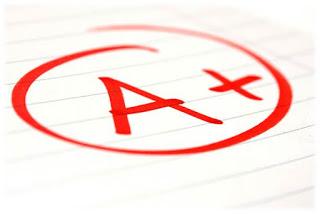
At once time or another I'm sure every teacher has been asked by a student to re-grade their writing. Usually what happens is that they'll come to you and say something like they think they deserve a higher grade. Sometimes, they'll bring their friend's paper and say their friend got a higher score and they think that they also deserve a higher score.
In the past I made the mistake of increasing their score. In hindsight, this definitely was a major mistake to make. First of all, it tells the student that you didn't do a good job grading. Second, it lets them know that if they complain, you'll raise their grade. The only reason I would give them a higher grade when they came and complained was to appease them. Once students find out you'll raise their score if they come talk to you, you'll be bombarded by students.
After over a decade of teaching at the university level, I know what grade a student deserves. Due to the that and the fact that it can be depressing for students to see red all over their paper, I don't correct every single mistake. Plus there's the fact that very few students will actually look at the corrections I've made.
One little change I've made has dramatically decreased the amount of complaints I have once I hand a writing activity back.When students come to me and ask me to re-consider the grade I gave them I start at the very beginning and correct every single mistake. Usually after a sentence or two the student will realize that they got a higher score than they deserved. If not, I'll refer to the rubric and start deducting points. Then I'll give them the option of keeping their score or changing it. When they come with their friend's paper, I do the same to their friend's paper and they quickly realize that their friend will lose points.
Some people will say that it sounds mean, but I personally know that I do a good job grading and grade fairly. I don't play favourites. More often than not give them higher scores than other teachers would. This isn't a problem since all my students are graded against themselves: not against other teachers' students. In addition, there's a curve involved.
Granted, there are times when I've made a mistake with the math involved and when that happens I'll happily change their score. However, if you make this one change, students will realize that complaining will not necessarily raise their score and if anything, it will decrease it.
In the past I made the mistake of increasing their score. In hindsight, this definitely was a major mistake to make. First of all, it tells the student that you didn't do a good job grading. Second, it lets them know that if they complain, you'll raise their grade. The only reason I would give them a higher grade when they came and complained was to appease them. Once students find out you'll raise their score if they come talk to you, you'll be bombarded by students.
After over a decade of teaching at the university level, I know what grade a student deserves. Due to the that and the fact that it can be depressing for students to see red all over their paper, I don't correct every single mistake. Plus there's the fact that very few students will actually look at the corrections I've made.
One little change I've made has dramatically decreased the amount of complaints I have once I hand a writing activity back.When students come to me and ask me to re-consider the grade I gave them I start at the very beginning and correct every single mistake. Usually after a sentence or two the student will realize that they got a higher score than they deserved. If not, I'll refer to the rubric and start deducting points. Then I'll give them the option of keeping their score or changing it. When they come with their friend's paper, I do the same to their friend's paper and they quickly realize that their friend will lose points.
Some people will say that it sounds mean, but I personally know that I do a good job grading and grade fairly. I don't play favourites. More often than not give them higher scores than other teachers would. This isn't a problem since all my students are graded against themselves: not against other teachers' students. In addition, there's a curve involved.
Granted, there are times when I've made a mistake with the math involved and when that happens I'll happily change their score. However, if you make this one change, students will realize that complaining will not necessarily raise their score and if anything, it will decrease it.
